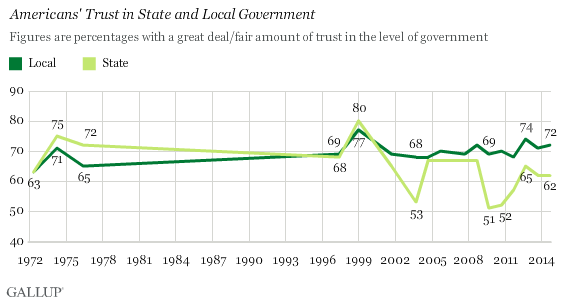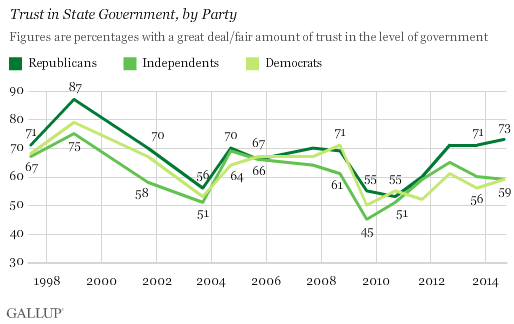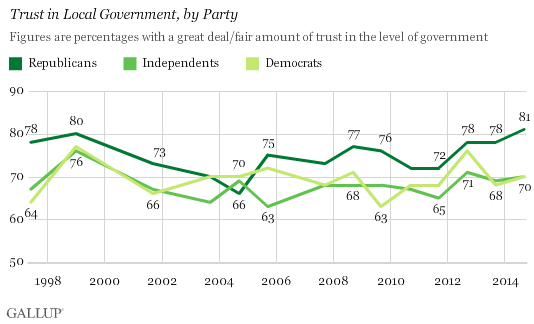WASHINGTON, D.C. -- As they have for more than a decade, Americans continue to trust their local governments (72%) more than their state governments (62%). Both levels of confidence in 2014 are unchanged from last year, and are only a few percentage points off from their historical averages.

The stability in state and local government trust, as measured in the Sept. 4-7 Governance poll, contrasts with this year's declines in trust in the federal government to handle international and domestic problems, and in two of the three branches of the federal government.
Since 2001, local government has consistently garnered more trust from Americans than state government. When Gallup first asked Americans the question in 1972, a record low of 63% said they had a "great deal" or "fair amount" of confidence in their local government. Confidence reached a high of 77% in 1998, amid a national economic boom.
Trust in state government, on the other hand, has been more varied and vulnerable to economic downturns, reaching lows in 2009 (51%) and 2010 (52%) as states struggled to pass budgets during the recent recession. Just like on the local level, the robust economy in 1998 spurred confidence in state government, which peaked at 80% that year and marginally surpassed trust in local government for the last time before the new millennium.
Republicans Significantly More Likely Than Dems, Independents to Trust State Government
Nearly three in four Republicans (73%) currently have a great deal or fair amount of trust in their state government -- much higher than the 59% among Democrats and independents. Since 1997, Republicans have typically expressed more confidence in state government than their Democratic and independent counterparts have, with a few exceptions between 2005 and 2010, when they tied with Democrats. But the partisan disparity in trust has grown wider in recent years, with Republicans now leading the other groups by 14 points.

Independents have generally been less likely than Republicans and Democrats to express confidence in state government. They also are the only group whose trust in state government has ever fallen below the 50% mark, in 2009. But independents' and Democrats' scores have often been similar. They tied this year and their historical average -- 61% -- is on par with Democrats' average of 62%.
More Than Four in Five Republicans Have Confidence in Local Government
Republicans have also expressed generally higher levels of confidence in local government than independents and Democrats have. This year, 81% of Republicans have a great deal or fair amount of trust in their local governments, similar to the previous high in 1998.

Independents have shown the least confidence in local government in all but a few polls -- though they maintained a majority level of trust each time. Independents' and Democrats' record-low confidence is 63%, and each group's trust peaked in 1998, along with that of Republicans.
In 2004, when Republican President George W. Bush was in office, Democrats' confidence in local government (70%) was similar to that of independents (69%) but they had a slight edge over Republicans (66%).
Bottom Line
Though Americans' current confidence ratings in state and local governments are nothing out of the ordinary, Republicans' trust in each is increasing. Republicans have typically expressed the most trust in these levels of government in the past, but the widening gap between Democrats and Republicans could have several significant explanations and implications.
For one, the GOP's mantra of smaller government could translate literally to higher levels of trust in governments that are both smaller and closer to the citizens they are designed to serve. Republicans are most likely to see the federal government as wasteful, and are least confident in its ability to handle international and domestic issues. But their level of confidence grows with each descending level of government, with local government receiving the highest rates of trust.
But the GOP's increasing trust in state and local levels of government could also reflect a shift in the GOP's power players, who are resigned to showcasing the party's ideas on the state level as Democratic control of the White House as well as the U.S. Senate keeps Republican influence on the federal level at bay. Prior to 2012, the previous highs in confidence among Republicans took place in the late '90s, when another Democrat was president.
While the GOP has had limited power at the federal level in recent years, some of the party's stars -- and prospective 2016 presidential candidates -- have been governors who have taken the national spotlight for their firm, and often controversial, Republican stances on issues in their home states. On issues including taxes, union contracts, immigration, same-sex marriage, voter ID bills, and restrictions to abortion, Republican governors have been the party's most powerful representatives of national GOP ideals during the Democratic Obama administration.
Survey Methods
Results for this Gallup poll are based on telephone interviews conducted Sept. 4-7, 2014, with a random sample of 1,017 adults, aged 18 and older, living in all 50 U.S. states and the District of Columbia.
For results based on the total sample of national adults, the margin of sampling error is ±4 percentage points at the 95% confidence level.
Interviews are conducted with respondents on landline telephones and cellular phones, with interviews conducted in Spanish for respondents who are primarily Spanish-speaking. Each sample of national adults includes a minimum quota of 50% cellphone respondents and 50% landline respondents, with additional minimum quotas by time zone within region. Landline and cellular telephone numbers are selected using random-digit-dial methods. Landline respondents are chosen at random within each household on the basis of which member had the most recent birthday.
Samples are weighted to correct for unequal selection probability, nonresponse, and double coverage of landline and cell users in the two sampling frames. They are also weighted to match the national demographics of gender, age, race, Hispanic ethnicity, education, region, population density, and phone status (cellphone only/landline only/both, and cellphone mostly). Demographic weighting targets are based on the most recent Current Population Survey figures for the aged 18 and older U.S. population. Phone status targets are based on the most recent National Health Interview Survey. Population density targets are based on the most recent U.S. census. All reported margins of sampling error include the computed design effects for weighting.
In addition to sampling error, question wording and practical difficulties in conducting surveys can introduce error or bias into the findings of public opinion polls.
View survey methodology, complete question responses, and trends.
For more details on Gallup's polling methodology, visit www.gallup.com.
